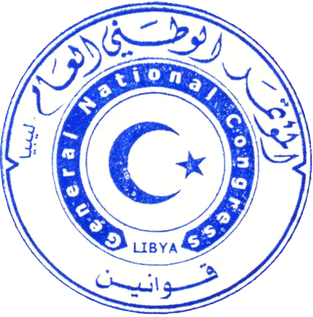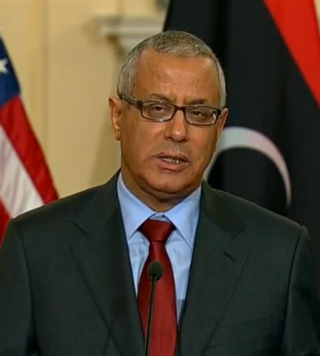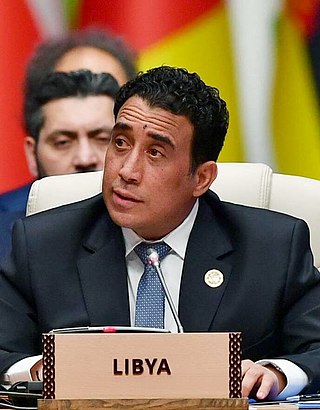 |
|---|
|
The Cabinet of Libya serves as the leadership for the executive branch of the government of Libya.
 |
|---|
|
The Cabinet of Libya serves as the leadership for the executive branch of the government of Libya.
Abdul Hamid Dbeibeh was selected as Prime Minister of Libya in the Libyan Political Dialogue Forum on 5 February 2021 [1] and a list of cabinet appointees was released on 11 March 2021. [2] The Dbeibeh Cabinet replaced the rival al-Sarraj and al-Thani cabinets.
In March 2022, Minister of Civil Service, Abdul Fattah Saleh Muhammad Al-Khawja, and the Minister of State for Immigration Affairs, Ijdid Maatouk Jadeed, resigned after the House of Representatives granted confidence to and sworn-in the rival Government of National Stability led by Fathi Bashagha. [3]
| Incumbent | Office | Website | Since | Arab Name |
|---|---|---|---|---|
| Abdul Hamid Dbeibeh | Prime Minister of Libya | www.pm.gov.ly | 15 March 2021 | عبد الحميد الدبيبة |
| Minister of Defense | www.defense.gov.ly | |||
| Hussein Atiya Abdul Hafeez Al-Qatrani | Deputy Prime Minister for East Libya | 15 March 2021 | ||
| Ramadan Boujenah | Deputy Prime Minister for South Libya | 15 March 2021 | رمضان بوجناح | |
| Minister of Health | 9 December 2022 | |||
| Ali Al-Zinati | 15 March 2021 to 9 December 2022 | |||
| Khaled Al-Mabrouk Abdullah | Minister of Finance | www.mof.gov.ly Archived 5 February 2006 at the Wayback Machine | 15 March 2021 | |
| Najla Mangoush | Minister of Foreign Affairs | www.foreign.gov.ly | 15 March 2021 to 28 August 2023 | |
| Fathallah al-Zani | 28 August 2023 (acting) [4] | |||
| Minister of Youth | 15 March 2021 | |||
| Khaled Mazen | Minister of Interior | www.moi.gov.ly Archived 20 May 2014 at the Wayback Machine | 15 March 2021 to 22 July 2022 | |
| Bashir Al-Amin | 22 July 2022 to 6 November 2022 (acting) | |||
| Emad Trabelsi | 6 November 2022 | |||
| Halima Ibrahim Abdel Rahman | Minister of Justice | www.aladel.gov.ly | 15 March 2021 | |
| Musa Muhammad al-Maqrif | Minister of Education | www.edu.gov.ly | 15 March 2021 | |
| Imran Muhammad Abdul Anabi Al-Qeeb | Minister of Higher Education and Scientific Research | www.edu.gov.ly | 15 March 2021 | |
| Saeed Sifaw | Minister of Technical and Vocational Education | www.edu.gov.ly | 15 March 2021 | |
| Kamel Braik Al-Hassi | Minister of Planning | www.planning.gov.ly | 15 March 2021 | |
| Wafaa Abu Bakr Muhammad al-Kilani | Minister of Social Affairs | www.socialaffairs.gov.ly | 15 March 2021 | |
| Omar Ali Al-Ajili | Minister of Economy & Trade | 15 March 2021 | ||
| Ahmed Ali Muhammad Omar | Minister of Industry and Minerals | www.industry.gov.ly Archived 13 August 2006 at the Wayback Machine | 15 March 2021 | |
| Abdul Fattah Saleh Muhammad Al-Khawja | Minister of Civil Service | 15 March 2021 | ||
| Badr Al-Din Al-Sadiq Al-Toumi | Minister of Local Government | 15 March 2021 | ||
| Muhammad Ahmad Muhammad Aoun | Minister of Oil and Gas | 15 March 2021 | ||
| Ali Al-Abed Al-Reda Abu Azoum | Minister of Labour | www.labour.gov.ly | 15 March 2021 | |
| Hamad Abdul-Razzaq Taher Al-Marimi | Minister of Agriculture | 15 March 2021 | ||
| Mabrouka Othman Oki | Minister of Culture and Knowledge Development | 15 March 2021 | ||
| Tariq Abdel Salam Mustafa Abu Flika | Minister of Financial Resources | 15 March 2021 | ||
| Tawfiq Saeed Moftah Al-Dorsi | Minister of Livestock and Marine Resources | 15 March 2021 | ||
| Abdul Shafi Hussein Muhammad Al-Juifi | Minister of Sports | 15 March 2021 | ||
| Abd Al-Salam Abdullah Al-Lahi-Tiki | Minister of Tourism and Handicrafts | 15 March 2021 | ||
| Ibrahim Al-Arabi Mounir | Minister of Environment | 15 March 2021 | ||
| Zuhair Ahmed Mahmoud | Minister of Housing and Construction | 15 March 2021 | ||
| Muhammad Salem Al-Shahoubi | Minister of Transportation | 15 March 2021 | ||
| Houria Khalifa Miloud | Minister of State for Women's Affairs | 15 March 2021 | ||
| Salama Ibrahim Al-Ghwail | Minister of State for Economic Affairs | 15 March 2021 | ||
| Ahmed Faraj Mahjoub Abu Khuzam | Minister of State for Displaced Affairs and Human Rights | 15 March 2021 | ||
| Walid Ammar Muhammad Ammar Al-Lafi | Minister of State for Communication and Political Affairs | 15 March 2021 | ||
| Ijdid Maatouk Jadeed | Minister of State for Immigration Affairs | 15 March 2021 | ||
| Abdel Jumaa Amer | Minister of State for Prime Minister and Cabinet Affairs | 15 March 2021 | ||
A national unity government, government of national unity (GNU), or national union government is a broad coalition government consisting of all parties in the legislature, usually formed during a time of war or other national emergency. A unity government lacks opposition, or opposition parties are too small and negligible.

The Constitutional Declaration is the current supreme law of Libya, introduced due to the overthrow of the Gaddafi government in the Libyan Civil War. It was finalised on 3 August 2011 by the National Transitional Council, and is intended to remain in effect until a permanent constitution is written and ratified in a referendum. The document was publicly announced at a press conference of 10 August by Abdul Hafiz Ghoga, Vice President and official spokesman of the NTC.

The General National Congress or General National Council was the legislative authority of Libya for two years following the end of the First Libyan Civil War. It was elected by popular vote on 7 July 2012, and took power from the National Transitional Council on 8 August.

Ali Zeidan is a former Prime Minister of Libya. He was appointed by the General National Congress on 14 October 2012, and took office on 14 November after Congress approved his cabinet nominees. Prior to the Libyan Civil War, Zeidan was a Geneva-based human rights lawyer and according to the BBC, he is considered by some local observers as a strong-minded liberal. He was ousted by the parliament committee and fled from Libya on 14 March 2014. However, he told the press conference in Rabat, Morocco, that the ousting was invalid.

The Libyan House of Representatives (HoR) is the legislature of Libya resulting from the 2014 Libyan parliamentary election, which had an 18% turnout. In late 2014, following the failed coup attempt to take over the capital Tripoli in the context of the Libyan Civil War, the House of Representatives relocated itself to Tobruk in the far east of Libya. Several HoR sessions were held in Tripoli in May 2019 while Tripoli was under armed attack, electing an Interim Speaker for 45 days. Between 2014 and 2021, the House of Representatives supported the Tobruk-based government led by Abdullah al-Thani before supporting the incumbent Government of National Unity led by Abdul Hamid Dbeibeh. In September 2021, the House of Representatives passed a no-confidence motion against the interim GNU government.

The Government of National Accord was an interim government for Libya that was formed under the terms of the Libyan Political Agreement, a United Nations–led initiative, signed on 17 December 2015. The agreement was unanimously endorsed by the United Nations Security Council, which welcomed the formation of a Presidency Council for Libya and recognized the Government of National Accord as the sole legitimate executive authority in Libya. On 31 December 2015, Chairman of the Libyan House of Representatives, Aguila Saleh Issa declared his support for the Libyan Political Agreement. The General National Congress has criticized the GNA on multiple fronts as biased in favor of its rival parliament the House of Representatives.

The Presidential Council is a body formed under the terms of the Libyan Political Agreement which was signed on 17 December 2015. The Council carries out the functions of head of state of Libya and is proposed to command the Libyan Armed Forces. The agreement has been unanimously endorsed by the United Nations Security Council which welcomed the formation of the Presidency Council and recognized that the Government of National Accord is the sole legitimate executive government of Libya.

The Libyan presidential election had originally been planned for 10 December 2018, but was delayed due to Khalifa Haftar's Western Libya campaign. The election was thereafter scheduled to be held on 24 December 2021 but was indefinitely postponed after the head of the High National Election Commission (HNEC) ordered the dissolution of the electoral committees nationwide.

Fathi Ali Abdul Salam Bashagha, known simply as "Fathi Bashagha" or occasionally Fathi Ali Pasha, is a Libyan politician and the former interim prime minister of Government of National Stability. He served as Minister of Interior from 2018 to 2021.

The Libyan peace process was a series of meetings, agreements and actions that aimed to resolve the Second Libyan Civil War. Among these were the Skhirat agreement of December 2015 and the plans for the Libyan National Conference in April 2019 that were delayed because of the 2019–20 Western Libya campaign.
The 2020 Libyan protests consisted of street protests over issues of poor provision of services in several cities in Libya, including cities controlled by the Government of National Accord (GNA) in the west and by the Libyan National Army (LNA) in the east (Benghazi) and south (Sabha) of Libya.

The Libyan Political Dialogue Forum (LPDF) is an intra-Libyan political body involved in series of meetings started in late 2020, initially aiming to lead to Libyan elections, Libyan peace process and "democractic legitimacy of Libyan institutions", mainly taking place in the context of the Second Libyan Civil War. The LPDF continues with involving both Government of National Unity and the Government of National Stability as current leading elements of the peace process.
Events in Libya in 2021.

Abdul Hamid al-Dbeibeh is a Libyan politician and businessman who is the prime minister of Libya under the Government of National Unity (GNU) in Tripoli. Dbeibeh was appointed on 15 February 2021 through the Libyan Political Dialogue Forum, and he was expected to hold the office until elections on 24 December 2021, which were later postponed.

Mohamed Yunus al-Menfi is a Libyan diplomat and politician. On 5 February 2021, he was chosen as the president of the Libyan Presidential Council at the Libyan Political Dialogue Forum. Previously, he had served as the Libyan Ambassador to Greece.

The Government of National Unity is a provisional government for Libya formed on 10 March 2021 to unify the rival Government of National Accord based in Tripoli and the Second Al-Thani Cabinet, based in Tobruk. Abdul Hamid Dbeibeh is the Prime Minister of the unity government and was selected in the Libyan Political Dialogue Forum on 5 February 2021. It is de facto backed by the governments of Turkey, Qatar, Algeria, Pakistan and Palestine.

Parliamentary elections have been scheduled to be held in Libya since 2021. Originally scheduled for 10 December 2021, elections has been pushed back multiple times amid the ongoing political crisis in Libya.
The 2022 Tripoli clashes erupted between forces loyal to rival Libyan prime ministers Fathi Bashagha and Abdul Hamid Dbeibeh over the capital city of Tripoli.

The Government of National Stability is a provisional government of Libya based in Sirte that formed on 3 March 2022, led by Osama Hamada and supported by the House of Representatives and the Libyan National Army. Since its inception, the government has claimed power over Libya in competition with the Government of National Unity led by Abdul Hamid Dbeibeh, with the Libyan Political Dialogue Forum coordinating the ceasefire agreement.